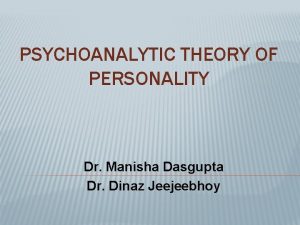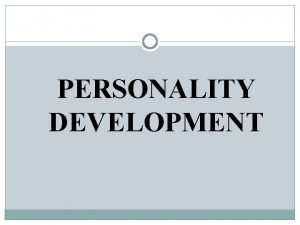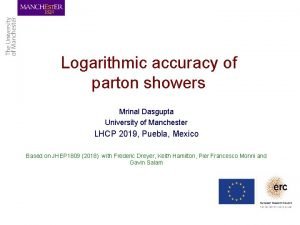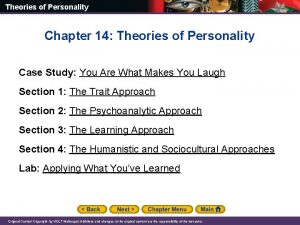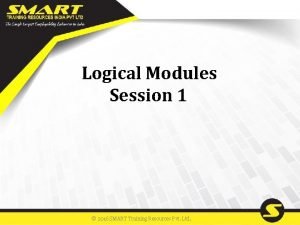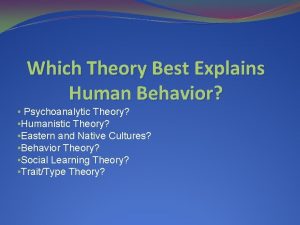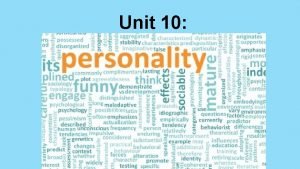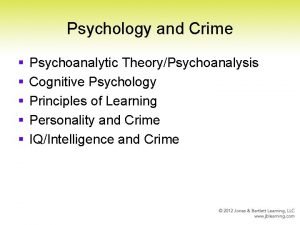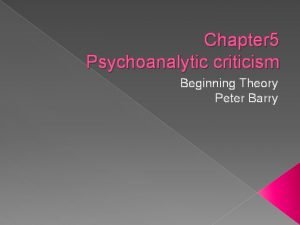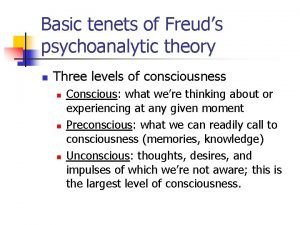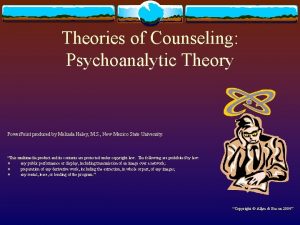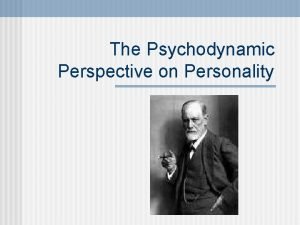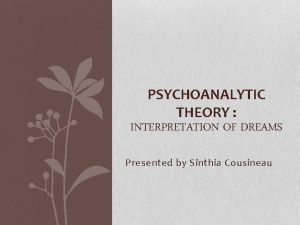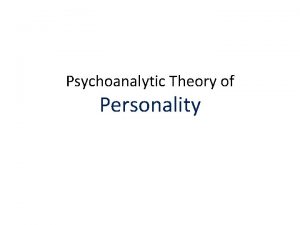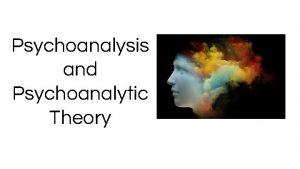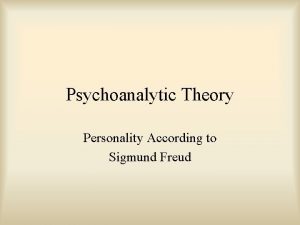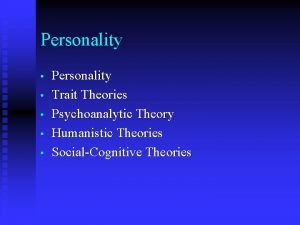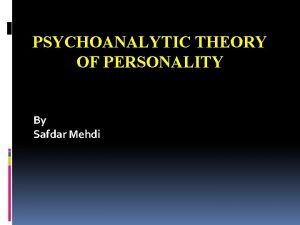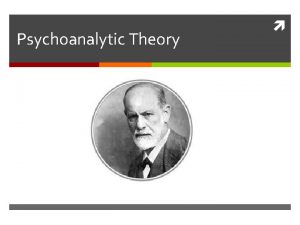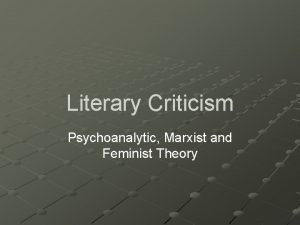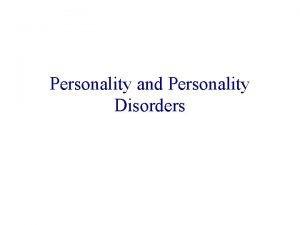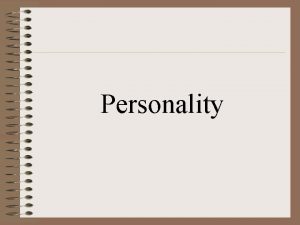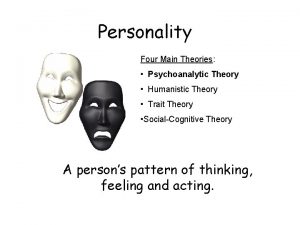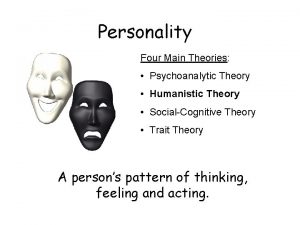PSYCHOANALYTIC THEORY OF PERSONALITY Dr Manisha Dasgupta Dr






















- Slides: 22

PSYCHOANALYTIC THEORY OF PERSONALITY Dr. Manisha Dasgupta Dr. Dinaz Jeejeebhoy

PROPONENT: Sigmund Freud (regarded as the Father of Psychoanalysis)

KEY FEATURES Role of the UNCONSCIOUS; Influence of EARLY EXPERIENCES in shaping personality; Presence of different PSYCHO-SEXUAL STAGES OF PERSONALITY;

BASIC ASSUMPTIONS • Principle of PSYCHIC DETERMINISM: • According to Freud, no aspect of human behaviour is accidental. • Existence of an UNCONSCIOUS LEVEL of the mind: • Role of the dynamic unconscious. • GOAL-DIRECTED BEHAVIOUR: • This principle asserts that all behaviour is motivated and goal-directed in nature. • DEVELOPMENTAL APPROACH: • Adult behaviour derives from the experience of the growing child. In psychodynamics, the first five years of life are seen as the source of experiences and conflicts that are crucial to the development of personality.

FIVE DIFFERENT ASPECTS: METAPSYCHOLOGICAL APPROACH IN PERSONALITY Topographic al aspect Structur al aspect Genetic aspect Dynamic aspect Econom ic aspect

I. TOPOGRAPHICAL THEORY OF MIND

II. STRUCTURAL THEORY OF PERSONALITY

ID � Innate biological instincts and urges; selfserving, irrational, and totally unconscious � Works on PLEASURE PRINCIPLE: Wishes to have its desires (pleasurable) satisfied NOW, without waiting and regardless of the consequences

EGO � Executive; �Partially directs Id energies conscious and partially unconscious �Works on REALITY PRINCIPLE: Delays action until it is practical and/or appropriate

SUPEREGO � Judge or censor for thoughts and actions of the ego � Superego comes from our parents or caregivers; guilt comes from the superego � Two parts: � CONSCIENCE: Reflects actions for which a person has been punished � EGO IDEAL: Second part of the superego; reflects behavior one’s parents approved of or rewarded

III. GENETIC ASPECT OF PERSONALITY Is based on two premises: - The first, the genetic approach, emphasizes that adult personality is shaped by various types of early childhood experiences. - The second is that a certain amount of sexual energy (libido) is present at birth and thereafter progresses through a series of psychosexual stages that are rooted in the instinctual processes of the organism.

LIBIDO has been conceived of by Freud to be an energyforce that was capable of multiple shifts and transformation, within the psychic system. It is the basic mental fuel in one’s life. It is of two types: � Eros (life energy) � Thanatos (death energy) Eros refers to the whole complex of life-preservative instincts. It has been regarded as the Greek God of love. Thanatos (Greek God of Death) refers to theoretical generalized instinct for death, as expressed in such behaviours as denial, rejection and turning away from pleasure.

FREUDIAN PERSONALITY DEVELOPMENT � Develops in stages; everyone goes through same stages in same order � Majority of personality is formed before age 6 � Erogenous Zone: Area of the body capable of producing pleasure � Fixation: Unresolved conflict or emotional hang-up caused by overindulgence or frustration

Oral stage (Birth -18 months) Oral cavity – erogenous zone; activity: sucking & biting � Anal stage (18 months – 3 yrs. ) Anal sphinchter muscles – erogenous zone; activity: expulsion & retention � Phallic stage (3 yrs. – 6 yrs. ) Phallus: erogenous zone Oedipus & Electra Complex; activity: affinity toward opposite sex parent � Latency stage (7 yrs – 11 yrs. ) Dormant stage; activity; same-sex peer affiliation � Genital stage (Puberty – Adulthood) Genital area: Erogenous zone; activity; mature heterosexual relationship �

Table 1: Freud’s Stages of Psychosexual

Figure 3: Freud believed that psychoanalysis could bring parts of the unconscious into the conscious mind, where the client could deal with them.

IV. DYNAMIC ASPECT OF PERSONALITY/ INSTINCT/ DRIVE THEORY � There are psychological forces. � The psychological forces are defined by their direction and magnitude. � The effect of simultaneously acting psychological forces may be the simple resultant of the work of each of these forces or may not hold true.

FEATURES OF AN INSTINCT SOURCE: The source of the instinct is the bodily condition or need from which it arises. The source of life instincts are clearly embedded in neurophysiology. Eg. Hunger, thirst AIM: The aim of an instinct is always to abolish or reduce the excitation/ tension deriving from its need, ie. , to seek immediate gratification while that of a wish is to seek gratification only. OBJECT: The object refers to any person or thing in the environment or within the individual’s own body that provides for the satisfaction (i. e. , the aim) of an instinct. IMPETUS: The impetus refers to the amount of energy force or pressure that is used to satisfy or gratify the instinct.

V. ECONOMIC POINT OF VIEW/ ECONOMIC ASPECT OF PERSONALITY Assumptions: � There are psychological energies. � Psychological conservation. energies follow � Psychological energies are subject to a law of entropy, ie. , they seek a state of balance or equilibrium. � Psychological energies transformations. are a law subject of to

FREUDIAN DEFENSE MECHANISMS: Habitual and unconscious (in most cases) psychological processes designed to reduce anxiety. Adopted by the Ego to adapt to situations.

FREUDIAN DEFENSE MECHANISMS: SOME EXAMPLES � DENIAL: Most primitive; refusing to believe, denying reality; usually occurs with death and illness � REPRESSION: When painful memories, anxieties, and so on are held out of our awareness � PROJECTION: When one’s own feelings, shortcomings, or unacceptable traits and impulses are seen in others; exaggerating negative traits in others lowers anxiety � RATIONALIZATION: Justifying personal “rational” but false reasons for them � REACTION FORMATION: Impulses are repressed and the opposite behavior is exaggerated actions by giving

CLASSIFICATION OF DEFENSE MECHANISMS: • • • Denial • Distortion • Projection • Altruism • Sublimation • Humour etc. Narcissistic Immature Mature Neuroti c Acting out Blocking Introjection’ Regression Somatization etc. • Displacement • Rationalization • Reaction formation
 Manisha dasgupta
Manisha dasgupta Sigmund freud psychoanalysis theory
Sigmund freud psychoanalysis theory Mrinal dasgupta
Mrinal dasgupta Amartya dasgupta
Amartya dasgupta Nairanjana dasgupta
Nairanjana dasgupta Ethernet lmi ce
Ethernet lmi ce Graphic organizer activity 14 theories of personality
Graphic organizer activity 14 theories of personality Free association psychology
Free association psychology What does the psychoanalytic approach to personality teach?
What does the psychoanalytic approach to personality teach? If determine is coded as enimreted then decide is coded as
If determine is coded as enimreted then decide is coded as Dr manisha mathur
Dr manisha mathur Dr manisha mishra
Dr manisha mishra Dr gunasekera gordon
Dr gunasekera gordon Site:slidetodoc.com
Site:slidetodoc.com Sigmund freud psychoanalytic theory
Sigmund freud psychoanalytic theory Psychoanalytic theory criminology
Psychoanalytic theory criminology Psychodynamic vs psychoanalytic
Psychodynamic vs psychoanalytic Psychoanalytic criticism ppt
Psychoanalytic criticism ppt Psychoanalytic theory defense mechanisms
Psychoanalytic theory defense mechanisms Main tenets of freud psychoanalytic theory
Main tenets of freud psychoanalytic theory Sigmund freud psychoanalytic theory
Sigmund freud psychoanalytic theory Defense mechanism examples
Defense mechanism examples Psychodynamic theory of dreaming
Psychodynamic theory of dreaming
